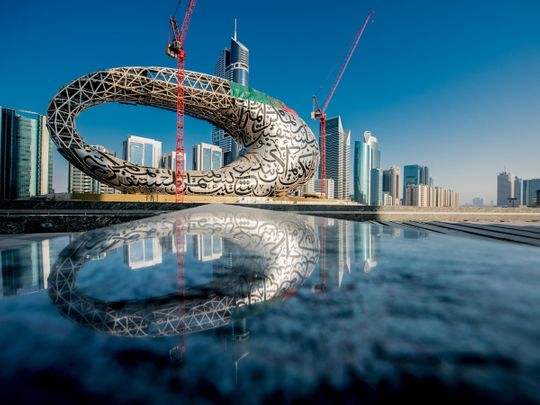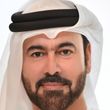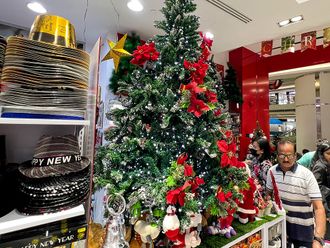
Dubai: Dubai Museum of the Future has been listed by National Geographic as one of the 14 most beautiful museums in the world for its astounding architecture and sophisticated technological innovations.
The museum, an architectural marvel that sits at the bustling heart of Dubai on Sheikh Zayed Road, is set to become a new global landmark once complete.
Mohammad Al Gergawi, Minister of Cabinet Affairs and vice-chairman of the board of trustees and managing director of the Dubai Future Foundation, said the selection of the Dubai Museum of the Future as a major world icon, even before its completion, captures the UAE’s leading status in innovation, design and architecture.
Hub for creativity
Al Gergawi added: “Dubai has established itself as a centre for creativity, thanks to the vision of His Highness Sheikh Mohammad Bin Rashid Al Maktoum, Vice President and Prime Minister of UAE and Ruler of Dubai. The emirate’s ambitions are reflected in an engineering miracle like the Dubai Museum of the Future that has been globally recognised as the world’s most beautiful museums even before its completion.
“The museum presents the UAE’s and the world’s gateway to the future with its design and latest technologies. The engineering icon positions Dubai as a testbed for emerging technologies and an exploration base for talents, inventors and creative professionals from all over the world to unravel the greatest challenges that will shape the future of humanity. Once complete, the museum will give visitors a glimpse of the future.”
Engineering miracle
Spanning an area of 30,000 square metres, the seven-storey pillar-less structure stands 77m tall. The stainless-steel façade, which extends over 17,000 square metres, is illuminated by 14,000m of Arabic calligraphy designed by the Emirati artist Mattar Bin Lahej.
The museum is also linked by two bridges, the first extending to Jumeirah Emirates Towers, with a length of 69m, and the second linking it to the Emirates Towers metro station, with a length of 212m.
Adorned with quotes
The Arabic calligraphy that adorns the façade includes quotes by Sheikh Mohammad. Among the quotes are “We may not live for hundreds of years, but the products of our creativity can leave a legacy long after we are gone” and “The future belongs to those who can imagine it, design it, and execute it... The future does not wait... The future can be designed and built today”.
Built by robots
The façade consists of 1,024 plates manufactured entirely by robots in a first-of-its-kind venture in the Middle East. Each plate of the façade consists of four layers, and each layer has been created after following 16 process steps. The installation period of the external facade lasted for more than 18 months, and each of the panels installed separately.
Model of sustainability
A model for sustainability in creative design, the Dubai Museum of the Future is powered by 4,000 megawatts of solar energy produced by a station connected to the building, in collaboration with the Dubai Electricity and Water Authority. Upon completion, the museum will be the first of its kind in the Middle East to obtain a Platinum Certification for Leadership in Environmental Energy and Design (LEED), the highest rating for green buildings in the world. The park surrounding the museum contains 80 species of plants, equipped with a state-of-the-art intelligent and automatic irrigation system.
International awards
The museum is considered as an unparalleled urban icon around the world. It won the Tikla International Building Award as a unique architectural model. Autodesk Design Software stated that the Dubai Museum of the Future is one of the most innovative buildings in the world. The building was designed by Architect Shaun Killa to offer visitors an interactive experience that is a first of its kind.
Incubator for future ideas
Contrary to the concept of conventional museums, the Dubai Museum of the Future is distinguished by being an incubator for innovative ideas, technology, and future projects. Equipped with immersive technologies, big data, artificial intelligence and robotics, the museum will showcase the future of mankind, cities, societies, life on Earth and even in outer space.









